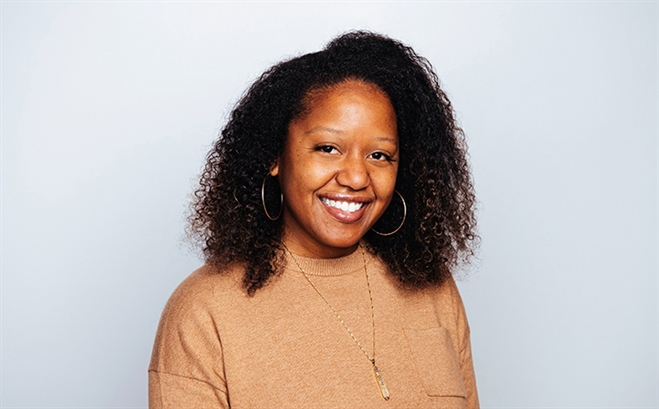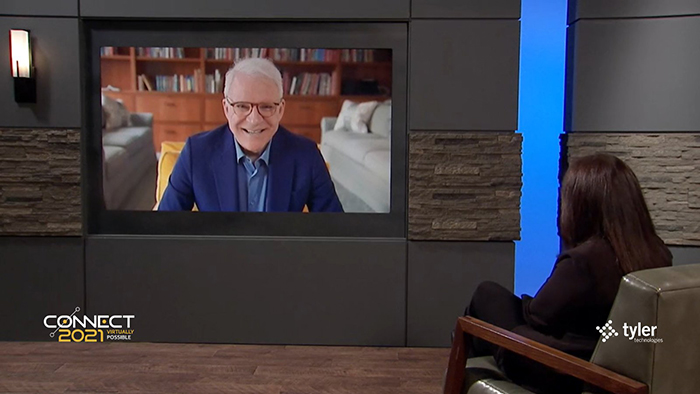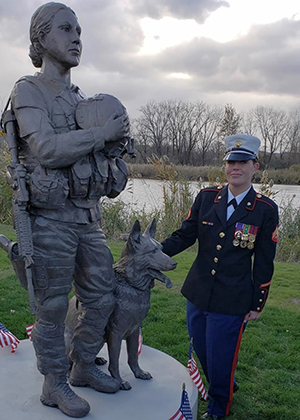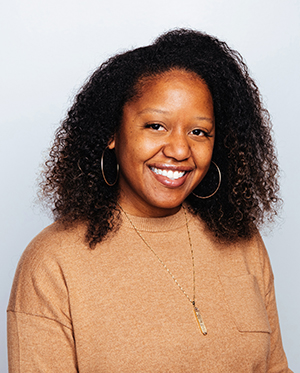Humor, Grit, and Ethics at Connect
April 29, 2021 by Meredith Trimble

As we near the end of the first-ever virtual Connect conference, attendees remain engaged in training sessions while also sharing takeaways, breakthroughs, and knowledge with peers and experts in collaborative "braindates." Some continue to attend to their minds and bodies with guided meditation, cardio training, or restorative yoga. Many are eagerly awaiting the results of the Connect Wellness Challenge, a step competition benefitting the San Antonio Food Bank. While the whirlwind of activity continues, we look back on some of the event's standout featured speakers.
A Conversation With Steve Martin

Steve Martin and Samantha Crosby
No conference is complete without a keynote guest, and Connect attendees were thrilled to experience an intimate conversation with Steve Martin, one of the most well-known and celebrated talents in entertainment.
In this enlightening conversation, Tyler's Chief Marketing Officer Samantha Crosby, asked Martin attendee-submitted questions that ranged from fun to poignant. Attendees got a heartwarming and often funny narrative of Martin's younger years in Texas, his adventures as a teenage magician in Disney Land, and his entry into comedy writing and stand up, which he called, "an endurance test for comedy."
Of his film career that followed, Martin noted, "I did 40 films because I knew I had to do that many to get five good ones!" In a rapid round of questioning, Crosby named some of Martin's movies and captured his first reaction to each. Some of his responses included:
- Planes, Trains, & Automobiles: John Candy
- It's Complicated: Moving from number one on the call sheet to number three thanks to Meryl Streep and Alec Baldwin
- Dirty Rotten Scoundrels: eating out with Frank Oz and enjoying peoples' reactions to his voice
- The Big Year: Owen Wilson and Jack Black playing golf at midnight
Martin's answers to other questions included "Two Wild & Crazy Guys" as one of his favorite Saturday Night Live.
"Tails" From an American Hero

The statue of Megan Leavey, CPL (Ret. USMC) and Rex is located at Haverstraw Bay County Park in Rockland County, New York.
Purple Heart recipient and U.S. Marine Veteran Megan Leavey is well-versed in perseverance and tenacity, themes the Connect audience well understands. Not only did she and her K9 military service dog Rex serve three years in Iraq and complete more than 100 missions, but they were also determined to make a comeback from traumatic injuries they suffered during an IED attack. Leavy's sincerity shone as she told her story, which began in the aftermath of the September 11, 2001, attacks. Compelled by that defining event, she joined the United States Marine Corps as part of the military police with the goal of being part of something bigger than herself and making a difference in the world.
To become part of the K9 unit, Leavy had to meet uniquely high standards. "I first met Rex," she said, "when I was in a bite suit, and he was biting me!" During Leavey's first deployment with Rex to Falluja, they formed their strong bond. Rex identified IEDs by sitting near the potential device sites, saving the lives of countless troops. In 2007, Leavey and Rex were sweeping an area of road when insurgents on a rooftop detonated an IED that exploded near the pair, injuring them both. Leavy chose not to reenlist after that deployment, but Rex remained in the K9 unit, though his injuries prevented him from deploying again. Along with the tough road of rehabilitation, Leavey endured a four-year battle to adopt Rex after the military initially denied her request.
During those years, Leavey continued to check in on Rex, never once giving up on her partner. When her adoption petition was finally granted, the reunion was filled with emotion. "Once I took the leash," Leavey said, "it was like no time had passed." Rex retired on his terms, barking heartily throughout his ceremony. The pair only had eight months together before then 10-year-old Rex passed away, "but," said Leavey, "it was worth everything." Their story was made into a movie and continues to remind all of us about our own abilities to adapt and overcome in any circumstance.
Data Ethics and You
The coronavirus pandemic brought responsible data sharing, including increased attention on the trustworthiness of data, to everyone's mind. Natalie Evans Harris, senior advisor to secretary of commerce and 16-year veteran of the National Security Agency, was on hand to discuss responsible data-sharing in this context with Connect attendees. "Now, more than ever, the need for responsible data-sharing is critical," Harris said. "We are used to telling people that we can either share data rapidly or responsibly. COVID-19 is forcing us to figure out how we can share data rapidly and responsibly."

Natalie Evans Harris, Senior Advisor to Secretary of Commerce
In discussing responsible data-sharing during — and after — a pandemic, Harris asked attendees to keep two key questions in mind:
- What role does government serve in ensuring equity of opportunities five to 10 years from now?
- What is the relationship between data, digital technology, and societal outcomes?
Harris suggested attendees to first consider their data capacity as a byproduct of their technology before diving into sharing-data for social good and delivering digital services. "We have to ask ourselves questions," she said, "like what is the data we are collecting, and how are we collecting it? Who has access to it, and what are those processes? And, really important, what is the privacy and ethics behind the data that we're capturing?"
Data-sharing best practices in "normal times" includes identifying use cases and establishing a robust data governance. In our new context, Harris suggested the following three approaches:
- Use what you have. Leverage existing data-sharing capacities and prepare now for the next time data-sharing quickly becomes critical.
- Work with others. Increase capacity by collaborating with private sector and volunteer agencies to develop solutions for improved response capabilities.
- Put it out there. Get the data out there for the ecosystem to thrive, putting it into machine-readable format and ensuring HIPPA compliance.
Harris recommend attendees assess their organizational culture around data use, including considering policies and technical standards for sharing. She acknowledged that it requires legwork to institutionalize a data culture, but that Connect attendees are not alone in this endeavor. "The future of data-sharing," Harris noted, "is really about creating the conditions for community resiliency."